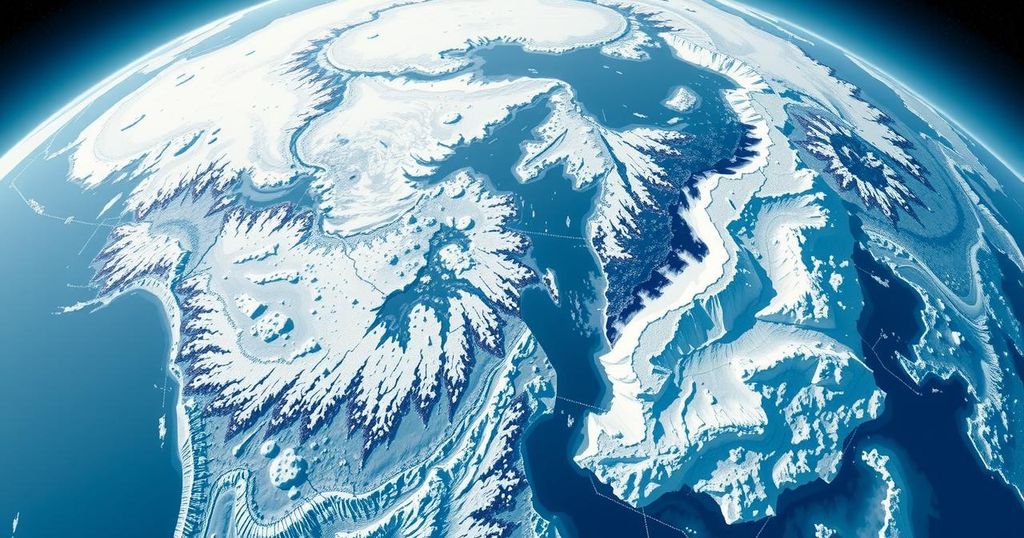Impending Threats from Polar Region Changes and Their Global Consequences

The polar regions are increasingly experiencing severe climate changes that threaten global weather patterns, ecosystems, and sea levels. Notably, the thawing of glaciers, changes in species habitats, and altered ocean currents due to human-induced climate change represent serious risks for humanity. Urgent action is required to address these challenges and mitigate potential catastrophes arising from these environmental shifts.
The polar regions, characterized by extreme cold and harsh conditions, play a pivotal role in regulating the global climate. As the “heart of the ocean,” the cold seawater in these areas drives currents that circulate throughout the planet, affecting climate and weather patterns even in midlatitude areas. The weakening of polar vortexes due to rising temperatures has resulted in cold air masses shifting southward, thus impacting regions far from the poles.
Furthermore, the polar regions are undergoing significant ecological changes, with organisms such as krill and marine algae at the base of the food chain being heavily influenced by these shifts. Human activities are significantly contributing to climate change; notably, polar regions are the most sensitive to these changes. Shin Hyoung-chul, of the Korea Polar Research Institute stated, “Climate change starts and ends in polar regions.”
Recent observations highlight that these regions are experiencing summer-like temperatures, an indication of global warming. For instance, at King Sejong Station in Antarctica, summertime temperatures reached between 18 and 20 degrees Celsius in 2021. Lee Won-sang, an Antarctic researcher, acknowledged notable changes over his 18 years of studies, asserting that such rapid changes are alarming as they should be subtle over long periods.
Thinning glaciers and altered marine life in the Arctic further illustrate the effects of climate change. Marine species, including a new squid type found in the Arctic, suggest that warmer ocean temperatures are driving these organisms northward. With significant ice loss, the sound of cracking ice has notably changed, indicating that old, thick ice is disappearing. Lee noted the increasing dangers associated with landing helicopters on unstable ice, underscoring the rapid alterations in the Antarctic landscape.
Among the most concerning aspects is the melting of glaciers, particularly the Thwaites Glacier, which has been dubbed the “Doomsday Glacier.” This glacier plays a crucial role in moderating the melting of other ice masses in Antarctica. Its annual shrinkage threatens to raise sea levels, potentially displacing millions of people from low-lying areas. The expected rise of 65 centimeters could have devastating humanitarian impacts, forcing mass migrations.
Moreover, the influx of freshwater from melting glaciers threatens ocean current circulation vital for climate regulation. Lee articulated that without cold, saltwater to drive these currents, global weather systems could be jeopardized. According to the fifth and sixth reports from the Intergovernmental Panel on Climate Change (IPCC), human activities have clearly contributed to climate warming, highlighting the urgency for action against climate change. Lee likened the Earth to a living entity undergoing regular medical examinations, emphasizing the necessity of acknowledging scientific evidence over myths surrounding climate change.
An understanding of climate change is crucial in today’s world, especially as it relates to polar regions. These areas, known for their extreme cold, are vital in controlling global climate patterns due to their influence over oceanic currents and weather systems. As global temperatures rise, the polar regions are witnessing significant transformations that threaten both ecological balance and human well-being. These shifts emphasize the urgent need for recognition and intervention to mitigate adverse effects on our planet.
In summary, the changes occurring in the polar regions signal potentially catastrophic consequences for both the planet and humanity. The evidence of climate change in these areas underscores the pressing need for action to address human impacts contributing to global warming. Researchers point out that continued inaction could lead to irreversible damage and significant disruptions in climate systems, risking the well-being of future generations.
Original Source: koreajoongangdaily.joins.com







